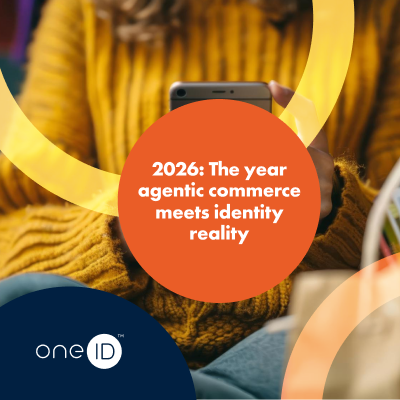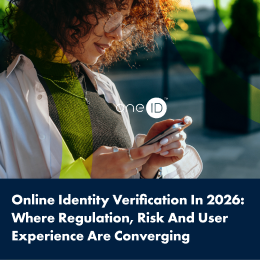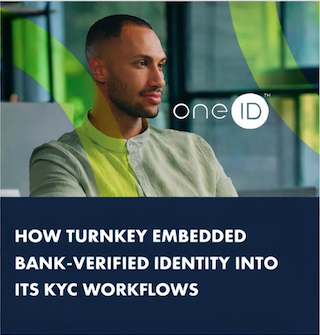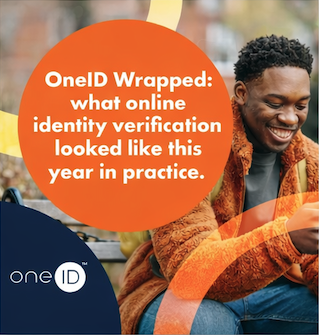As remote contract becomes the norm in business, verifying identities online has become critical to ensuring the validity of contracts. In part one of our eSign Spotlight Series, OneID®’s Chief Customer Officer, Keith Mabbitt, recently joined eSign partner Videosign for a webinar titled “eSigning—Dispelling Myths around Digital Identity Verification."
The webinar focussed on the different identity verification methods used in the digital signing process and how bank-verified digital identity adds strength, ease and speed to the process compared to traditional methods. Here are the key takeaways from the webinar.
Knowledge-based Authentication— Knowledge-based Authentication (KBA) requires users to answer questions before logging in. This can be static, such as a pre-set security question, or dynamic, like queries about credit history. While KBA adds a security layer, it can be vulnerable if the answers are easily guessable or compromised.
Document-based verification— Identity document verification involves presenting a physical government-issued ID to prove one's identity. However, with advancements in AI and other technologies, the risk of fraudulent documents remains high. The verifier also bears the responsibility of ensuring nothing is overlooked during the process, which can be cumbersome and error-prone.
Two-Factor Authentication— Two-factor authentication (2FA) adds an extra security layer by requiring a code sent via an app, text, or email. This method significantly enhances security, especially when passwords are weak or compromised. However, its effectiveness is tied to the initial password's strength and the secondary method's security.
Biometric authentication— Biometric methods, such as fingerprint and facial recognition, offer high security but raise privacy concerns. Technological advancements make these methods more accessible and reliable, easing some of the associated fears. These methods are becoming more user-friendly and efficient, providing robust security for sensitive transactions.
Bank-based identity verification— This method uses the most up-to-date identity data held by banks to verify an individual’s identity in a completely digital, document-free way. Since banks have already conducted rigorous Know Your Customer (KYC) checks and use Strong Customer Authentication (SCA) measures to authenticate individuals, bank-based data delivers identity assurance to very high confidence levels.
An efficient and secure alternative to physical ID verification
Bank-verified digital identity checks offer a solution that replaces the need for physical IDs, which are prone to fraud, especially in remote interactions. Unless asked in advance, individuals don’t carry their passports with them. When they have it with them, they have to hold the document to the camera in a way that is clear.
OneID® makes the process simpler and more efficient. By verifying that the individual has successfully logged into their bank via online banking or the mobile app and only sharing the required data with the eSign platform, OneID® offers a simple, secure, and completely digital process to cross-check identity data. This method is particularly useful in financial services, KYC processes, and client onboarding, streamlining the verification process and reducing the need for physical documents. For Videosign sessions, users have to launch their banking app, consent to share information, and their identity is confirmed in seconds.
Comprehensive Security Checks
Banks perform thorough KYC and Anti-Money Laundering (AML) checks, ensuring a holistic verification of an individual's identity. These checks are ongoing and include behavioural analysis to ensure that the account and identity have not been compromised or involved in fraudulent activities. In addition, OneID® can also verify identities against Politically Exposed Persons (PEPs) and Sanctions list. This dynamic approach provides a more accurate and secure identity verification process compared to traditional methods, which are static and point-in-time checks.
Wider coverage and greater accessibility
OneID® is integrated with all major high-street banks and many digital banks. This allows 50 million UK adults—which translates to 90% of UK adults—who have an online banking account to verify their identity instantly and conveniently. This greatly increases the number of people who can prove their identity in contrast to document-based identity verification, as 13% of UK adults don’t have a passport, and 25% don’t have a driver’s licence.
FCA-Regulated and Secure
OneID® is regulated by the Financial Conduct Authority (FCA), and the journey is secured by the same strong authentication methods that banks use. OneID® prioritises user privacy, so it only shares data with a platform with the user’s consent, does not access financial transactions or history, and never stores the user data. The identity data requested is shared directly with the requesting platform, like Videosign, in a secure and reliable way. This also minimises the data that businesses have to store – reducing the risk of data theft and GDPR compliance issues.
Streamlining identity verification across industries
Bank ID has gained traction across Europe – transforming industries that require strong identity checks and follow strict compliance measures. Financial services use it for customer onboarding and loan arrangements. The gambling industry relies on it for identity verification, and e-commerce uses it to verify customers' ages. Employment sectors also benefit, with government regulations now allowing remote employee verification. OneID® is also a certified identity service provider for Right to Work and Right to Rent checks.
Transforming the eSigning process
The eSigning process is at the forefront of normalising the use of digital tools. The adoption of a truly digital identity verification method will only enhance its convenience and robustness. For industries that require greater identity certainty, like finance, employment, and gambling, bank-based digital identity verification offers one of the most robust measures to be sure about the identity of the individual you’re dealing with. By incorporating OneID® into their process, Videosign is helping their clients minimise the pressures of manually verifying identities while on a call, speed up processes and enable client teams to focus on their core processes.
In part two of the OneID® eSign Spotlight Series, we were joined by our partner Nitro, and eSigning legal expert Richard Oliphant and discussed the regulations surrounding the use of digital identity in eSigning and the value it delivers.

Agentic commerce is already operating inside live retail, payments, and platform environments. For Partn...

Online identity verification entered a new phase in 2025. Across adult platforms, gambling, financial se...

Last month, we joined Turnkey for an industry event to talk about a challenge many regulated platforms a...

2025 has been a year of continued growth and real-world proof for OneID®. As expectations for identity a...